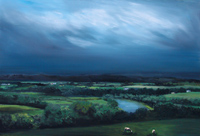March 1, 2012
The poetry of the Irish: New book by K-State expert examines poetic traditions of Ireland
Submitted by Communications and Marketing

As St. Patrick's Day approaches, a Kansas State University English professor is providing a poetic way to celebrate the Irish culture.
In her new book "Contemporary Irish Poetry and the Pastoral Tradition," Donna Potts, associate professor of English, examines the poetic traditions of Irish culture by exploring the pastoral genre, a genre in which humans have an intimate connection with the land.
The book's inspiration, Potts said, came from a personal connection to pastoral poets because of their involvement with land and labor.
"For Catholics in Ireland, where Protestants generally owned the land and Catholics were tenants on it, the rural landscape was not idealized but rather associated with hard work," Potts said. "Growing up, I certainly came to associate land with hard work. We had a few acres on which we grew tomatoes, potatoes, corn, etc. My dad jokingly called it the 'Garden of Weedin,' which he put on the sign for our produce stand.
"So although I read plenty of poems that idealized the landscape, I was always more comfortable with works like Virgil's 'Georgics' or Heaney's 'Field Work,' which depicted the land as the site of labor."
Potts examines six Irish poets in her book, including John Montague, Seamus Heaney, Michael Longley, Eavan Boland, Medbh McGuckian and Nuala Ni Dhomhnaill. All of these poets have written significant collections of pastoral poetry, and their work is in dialogue with both the pastoral tradition and other contemporary pastoral poets.
Through the exploration of these poets and their work, Potts reveals a wide range of purposes that the pastoral genre has served in both Northern Ireland and the Republic. Specifically, she said, it provides a postcolonial critique of British imperialism; a response to modernity, industrialization and globalization; a way of uncovering political and social repercussions of gendered representations of Ireland; and a means for conveying environmentalism's more complex understanding of the value of nature.
"Beginning with the Norman invasion of Ireland in the 12th century, the native Irish were gradually dispossessed from the land," Potts said. "They were increasingly likely to work as tenants on the land of absentee landlords. This changed relationship to the land led to nostalgia for the precolonial relationship. The impulse to write pastoral grows out of this kind of nostalgia."
Potts also traces the origins and evolution of the pastoral genre in her book, recognizing that while all pastoral poems share certain generic traits, pastorals are shaped by their social and historical contexts. Irish pastorals in particular were influenced by the country's unique relationship with the land, language and industrialization due to England's colonization.
In contrast to other studies of Irish poetry, Potts said she moves beyond the influence of history and politics to consider the relatively recent influence of ecology on contemporary Irish pastoral poetry.
"The Northern Irish poet Michael Longley has observed that the best way for a poet to convey concern for the environment is not through dogmatism, not through didacticism, but through figurative language that challenges readers' perspectives," she said. "The poet's best defense against 'damaging dogmatism' is to describe the world in a meticulous way that inspires in readers reverence and wonder for nature."
Potts' book concludes with speculation on the future of the pastoral genre in contemporary Irish poetry, specifically through the examination of more recent poets -- Moya Cannon and Paula Meehan -- as well as other genres such as film, drama and fiction.
"Contemporary Irish Poetry and the Pastoral Tradition" is available at local bookstores, online retailers or directly from Chicago Distribution services.
